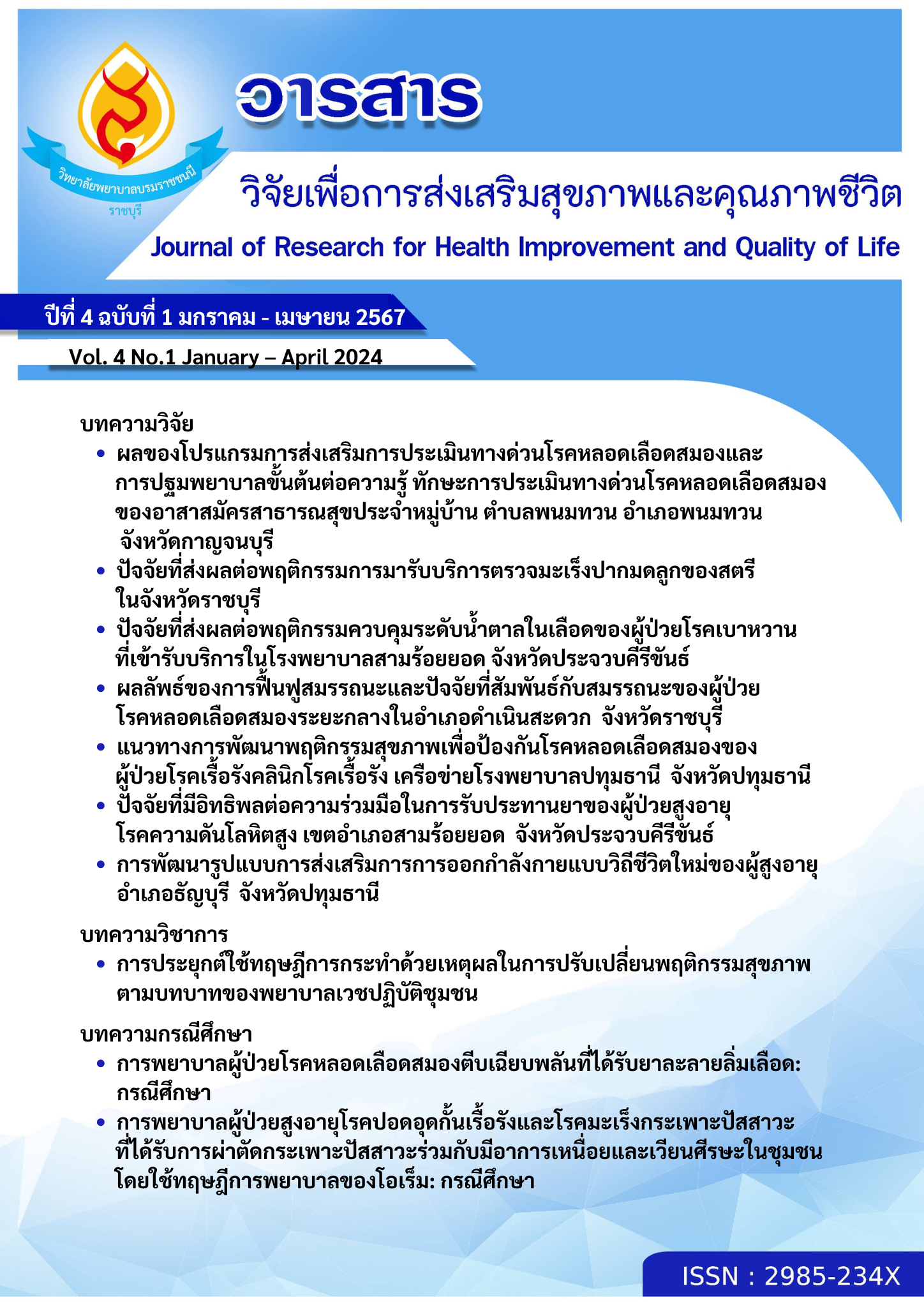การประยุกต์ใช้ทฤษฎีการกระทำด้วยเหตุผลในการปรับเปลี่ยนพฤติกรรมสุขภาพ ตามบทบาทของพยาบาลเวชปฏิบัติชุมชน
คำสำคัญ:
ทฤษฎีทฤษฎีการกระทำด้วยเหตุผล, พฤติกรรมสุขภาพ, พยาบาลเวชปฏิบัติชุมชนบทคัดย่อ
ปัญหาสุขภาพของผู้ป่วยในปัจจุบันส่วนใหญ่เกิดจากพฤติกรรมสุขภาพที่ไม่เหมาะสม ซึ่งการปฏิบัติพฤติกรรมของบุคคลมีจุดเริ่มต้นจากเหตุผล ทัศนคติ และความเชื่อของแต่ละบุคคลที่นำไปสู่การปฏิบัติพฤติกรรมต่างๆ ทฤษฎีการกระทำด้วยเหตุผลเป็นทฤษฎีทางพฤติกรรมศาสตร์ที่ใช้อธิบายความสัมพันธ์ระหว่างทัศนคติ ความตั้งใจ/ เจตนา และพฤติกรรมที่เกิดจากควบคุมได้ด้วยตนเอง การปรับเปลี่ยนพฤติกรรมสุขภาพที่ไม่เหาะสมจึงจำเป็นต้องปรับทัศนคติเกี่ยวกับพฤติกรรม สร้างต้นแบบสุขภาพที่ดีที่จะนำไปสู่การคล้อยตามกลุ่มอ้างอิง โดยใช้กระบวนการ 5 ขั้นตอน ได้แก่ การศึกษาสาเหตุของพฤติกรรม การปรับทัศนคติต่อพฤติกรรม การสร้าง แรงบันดาลใจในการปรับเปลี่ยนพฤติกรรม การส่งเสริมพฤติกรรมที่พึงประสงค์ และการประเมินผล ซึ่งการปรับเปลี่ยนพฤติกรรมอาจไม่สำเร็จในระยะแรกต้องอาศัยความร่วมมือจากทั้งระดับบุคคล ครอบครัว และชุมชนรวมทั้งการเสริมแรงและการติดตามอย่างต่อเนื่องจึงเกิดการปรับเปลี่ยนพฤติกรรมสุขภาพอย่างยั่งยืน
เอกสารอ้างอิง
Ajzen I. and Fishbein M. (1980). A theory of reasoned action: Some applications and implications. Nebraska Symposium on motivation, 27, 65-116.
Ajzen, I. (1985). From intentions to actions: a theory of planned behavior. In Action control: from cognition to behavior (pp. 11-39). Berlin: Springer-Verlag.
Ajzen, I. (1991). The theory of planned behavior. Organizational Behavior and Human Decision Processes, 50(2), 179-211.
Ajzen, I. (2011a). Behavioral interventions: design and evaluation guided by the theory of planned behavior. In Social psychology for program and policy evaluation (pp. 74–100). New York: Guilford.
Ajzen, I. (2012). The theory of planned behavior. In Handbook of theories of social psychology Vol. 1 (pp. 438–459). London: Sage.
Bass, B. M. (1985). Leadership: Good, better, best. Organizational dynamics, 13(3), 26-40.
Bloom, Benjamin S.J. (ed). (1975). Taxonomy of Education Objective, Hand Book 1 : Cognitive Domain.New York : David Mckay. Lewin, Kurt. (1951).
Ernst W. and Kneavel M. E. (2020). Development of a Peer Education Program to Improve Concussion Knowledge and Reporting in Collegiate Athletes. National Library of Medicie, 55(5), 448-455.
Goldenson, M. Robert. (1984). Longman Dictionary of Psychology and Psychiatry. New York : Longman
Good, C.V. 1973. Dictionary of education. 3rd ed. New York : McGraw-Hill.
Hale, J. L., Householder, B. J., & Greene, K. L. (2002). The theory of reasoned action. The persuasion handbook: Developments in theory and practice, 14(2002), 259-286.
Jeihooni, A. K., Harsini P. A., Kashfi S. M., Amirkhani M., and Zargar A. Y. (2021). Investigating the predictors of routine HIV screening behaviors in nurses based on theory of reasoned action. Polish Annals of Medicine, 28(1), 1-5.
Julintron, A., Yoelao, D., Saisombut, P. (2019). Theory of Reason Action and Theory of Planned Behavior: An Application to Business. Humanities, Social Sciences and Arts, 12(5), 128-145.
ดาวน์โหลด
เผยแพร่แล้ว
ฉบับ
ประเภทบทความ
สัญญาอนุญาต
ลิขสิทธิ์ (c) 2024 วิทยาลัยพยาบาลบรมราชชนนี ราชบุรี

อนุญาตภายใต้เงื่อนไข Creative Commons Attribution-NonCommercial-NoDerivatives 4.0 International License.
บทความทีตีพิมพ์ในวารสารนี้ถือว่าเป็นลิขสิทธิ์ของวิทยาลัยพยาบาลบรมราชชนนี ราชบุรี และผลงานวิชาการหรือวิจัยของคณะผู้เขียน ไม่ใช่ความคิดเห็นของบรรณาธิการหรือผู้จัดทํา




